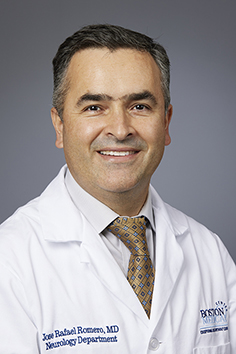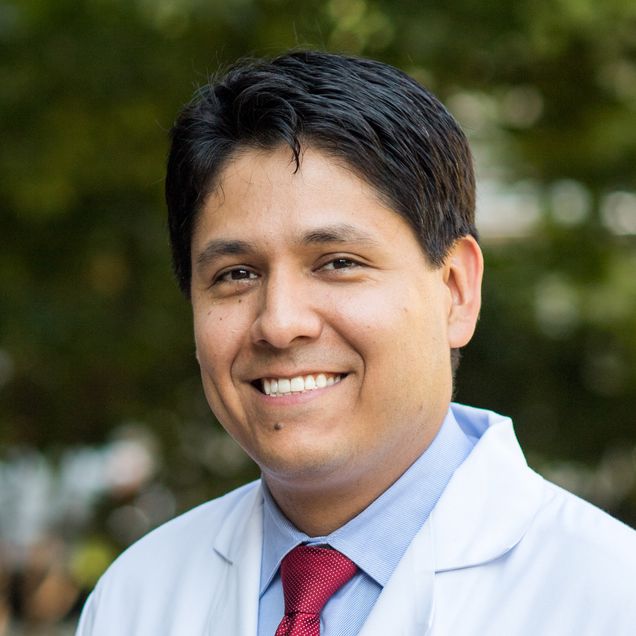Researchers Awarded $7.2 Million to Continue Stroke Surveillance Research at the Framingham Heart Study
Jose Rafael Romero, MD, associate professor of neurology at Boston University Chobanian & Avedisian School of Medicine, along with Hugo Javier Aparicio, MD, MPH, assistant professor of neurology, and Sudha Seshadri, MD, adjunct professor of neurology, have been awarded a five-year, $7.2 million grant from the National Institute of Neurological Disorders and Stroke. The funds will continue stroke surveillance research in Framingham Heart Study (FHS) cohorts and expand the research program to prediction tools, incorporating genetic, imaging, social and clinical data, for application in clinical practice and research.
 Romero has been an FHS investigator since 2006. His research interests center on the study of cerebrovascular disease in subclinical stages, prevention of stroke, cognitive impairment and dementia and use of neuroimaging in the epidemiological study of cerebrovascular disease. Much of his current work centers on the epidemiological study of brain MRI markers of cerebral small vessel disease, their determinants and clinical consequences. As a board-certified neurologist and vascular neurologist, his clinical interests are in the prevention, diagnosis, treatment and rehabilitation of patients with stroke, with particular emphasis on under-represented racial and ethnic groups.
Romero has been an FHS investigator since 2006. His research interests center on the study of cerebrovascular disease in subclinical stages, prevention of stroke, cognitive impairment and dementia and use of neuroimaging in the epidemiological study of cerebrovascular disease. Much of his current work centers on the epidemiological study of brain MRI markers of cerebral small vessel disease, their determinants and clinical consequences. As a board-certified neurologist and vascular neurologist, his clinical interests are in the prevention, diagnosis, treatment and rehabilitation of patients with stroke, with particular emphasis on under-represented racial and ethnic groups.
 Aparicio has been a researcher at FHS since 2014. His research interests include the identification of lifestyle risk factors, biomarkers, neuroimaging markers and genetic influences associated with cerebrovascular diseases. He is particularly interested in the contributions of vascular risk factors to stroke, brain injury and aging, cognitive dysfunction and the development of Alzheimer’s disease, and the influence of sex, race, and ethnic disparities on these outcomes.
Aparicio has been a researcher at FHS since 2014. His research interests include the identification of lifestyle risk factors, biomarkers, neuroimaging markers and genetic influences associated with cerebrovascular diseases. He is particularly interested in the contributions of vascular risk factors to stroke, brain injury and aging, cognitive dysfunction and the development of Alzheimer’s disease, and the influence of sex, race, and ethnic disparities on these outcomes.
Seshadri has been a senior investigator at the Framingham Heart Study since 1998 and is founding director of the Glenn Biggs Institute for Alzheimer’s & Neurodegenerative Diseases at University of Texas Health San Antonio. She has led neurology research programs at FHS since 2005 and is a renowned expert in Alzheimer’s disease, dementia, stroke epidemiology and the genetics of stroke and vascular brain injury.
Neurodegenerative Diseases at University of Texas Health San Antonio. She has led neurology research programs at FHS since 2005 and is a renowned expert in Alzheimer’s disease, dementia, stroke epidemiology and the genetics of stroke and vascular brain injury.
Launched in 1948, the goal of the FHS was to identify common factors or characteristics that contribute to cardiovascular disease. Over the years, the FHS has become a successful, multigenerational study that analyzes family patterns of cardiovascular and other diseases, while gathering more genetic information from the two generations that followed the original study participants. The FHS also has expanded to include diverse populations so that risk factors in these different groups can be understood. Boston University Chobanian & Avedisian School of Medicine has served as National Heart, Lung, and Blood Institute contractor and academic partner for the FHS study since 1971.